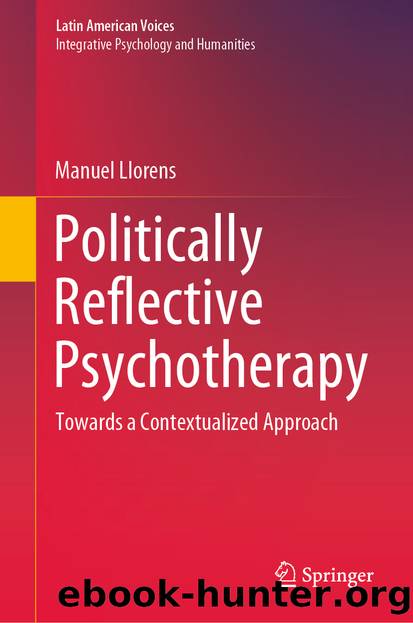Politically Reflective Psychotherapy by Manuel Llorens

Author:Manuel Llorens
Language: eng
Format: epub
ISBN: 9783030577926
Publisher: Springer International Publishing
The surprising and controversial character of repeated reports of sexual abuse in the lives of these women contributed in great part to Freudâs dismissal of his seduction theory (Masson, 1997). In the months following the publication of his âStudies on Hysteria,â Freud began to shift his theory and change his hypothesis of sexual abuse to presumed unconscious fantasies that expressed repressed desires. Later studies showed how difficult it was for Freud to deal with these observations at the beginning of his exploration of the unconscious and how he debated these ideas in the midst of his worries about the implications if these findings were true. The letters between Freud and Fliess evidence this, as Masson has controversially chronicled (1997).
These debates have continued in the following hundred years. The ordeal regarding Jeffrey Massonâs research on these historical events is revealing. The fact that, after being the Director of the Freud Archives, he was dismissed because of his controversial conclusions in the book âAssault on Truthâ, is a testament to the difficulty these issues pose to the clinical establishment. Even considering that Masson was tendentious, overinterpreting Freudâs fear and failing to recognize reasonable doubt, direct quotes evidence Freudâs reticence to expose clear cases of sexual harassment. The fact that Anna Freud tried to avoid the publication of Massonâs book is a terrible stain to psychoanalysis.
Other clinicians like Alice Miller, who were psychoanalytically trained, have also widely reported multiple cases in which analysts have left out clear evidence of situations of sexual abuse in their therapeutic work. She signals out how denial on the part of therapists, because of the emotional impact that incest produces, colludes with ideological beliefs rendering episodes of abuse invisible (1984/1991). This brings us back to a controversy that has been in psychoanalysis from its beginnings, and that Ferenczi presented in 1932 in the XII International Psychoanalytic Congress, with his now classic paper âThe Confusion of Tongues,â where he criticizes his colleagues for having disregarded for so long the âtraumatic factors in the pathogenesis of neurosisâ (149, p. 225).
The clinicians who continued during the twentieth century to insist on the importance of traumatic external events to obtain a complete and contextualized comprehension were often relegated to the margins of the scientific debate (Herman, 1997; Masson, 1997; Miller, 1997).
The resistance to recognize the presence of violence against children occurred in other places besides psychology. It wasnât until 1962 that the medical field began to do it, thanks to a pediatrician that began to report injuries found in his consulting room as product of mistreatment rather than accidents. When Henry Kempe published his article in 1948 on the âbattered child syndrome,â he met with considerable rejection of his ideas from the medical establishment (Wiehe, 1998).
It is relevant to mention these episodes to illustrate the difficulties psychology has had carrying the weight that comes with the recognition of the extension and severity of situations of abuse. On occasions, the impression that these findings produce is they are so terrible that they cannot possibly be true.
Download
This site does not store any files on its server. We only index and link to content provided by other sites. Please contact the content providers to delete copyright contents if any and email us, we'll remove relevant links or contents immediately.
| Administration & Medicine Economics | Allied Health Professions |
| Basic Sciences | Dentistry |
| History | Medical Informatics |
| Medicine | Nursing |
| Pharmacology | Psychology |
| Research | Veterinary Medicine |
Periodization Training for Sports by Tudor Bompa(8244)
Why We Sleep: Unlocking the Power of Sleep and Dreams by Matthew Walker(6689)
Paper Towns by Green John(5171)
The Immortal Life of Henrietta Lacks by Rebecca Skloot(4570)
The Sports Rules Book by Human Kinetics(4374)
Dynamic Alignment Through Imagery by Eric Franklin(4204)
ACSM's Complete Guide to Fitness & Health by ACSM(4046)
Kaplan MCAT Organic Chemistry Review: Created for MCAT 2015 (Kaplan Test Prep) by Kaplan(3994)
Introduction to Kinesiology by Shirl J. Hoffman(3757)
Livewired by David Eagleman(3757)
The Death of the Heart by Elizabeth Bowen(3599)
The River of Consciousness by Oliver Sacks(3590)
Alchemy and Alchemists by C. J. S. Thompson(3506)
Bad Pharma by Ben Goldacre(3415)
Descartes' Error by Antonio Damasio(3264)
The Emperor of All Maladies: A Biography of Cancer by Siddhartha Mukherjee(3135)
The Gene: An Intimate History by Siddhartha Mukherjee(3087)
The Fate of Rome: Climate, Disease, and the End of an Empire (The Princeton History of the Ancient World) by Kyle Harper(3051)
Kaplan MCAT Behavioral Sciences Review: Created for MCAT 2015 (Kaplan Test Prep) by Kaplan(2977)
